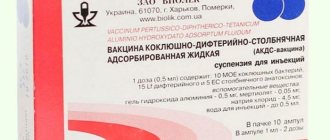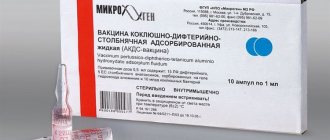Today we will learn what a medical exemption from vaccinations is, how to get it and why it is needed. This document may be extremely important. Therefore, you should not under any circumstances avoid registering it if the prerequisites exist for the process to take place. Vaccination may not go as smoothly as you would like if you neglect the medical procedure. So what kind of document is this?
What it is
A medical exemption is a document that provides a deferment for vaccination. Most often it is given to children. It confirms that the patient has contraindications for vaccination. Has a temporary effect.
Do not confuse medical withdrawal from vaccinations with refusing them. In the first case, this is an official medical document, in the second, it is the decision of the parents. Typically, this certificate is issued at the discretion of doctors. After this, the pediatrician draws up an individual vaccination schedule. And subsequent vaccinations will be done taking into account the availability of a medical outlet.
What is a vaccine honey drain?
A medical exemption from vaccination is a refusal to vaccinate, which is not based on personal prejudices, but on clear medical contraindications confirmed by a specialist. Today, legislation allows the issuance of such a document for a period of no more than 6 months. When this period expires, the person receives a new conclusion; it may contain information about the possibility of carrying out the vaccination procedure, or extend the exemption from the flu shot.
Who issues
Who should be responsible for issuing this document? It is not difficult to guess that this is done by medical institutions where this or that citizen is observed on an ongoing basis. It doesn’t have to be a public clinic, it can also be a private one. The main rule is regular monitoring of a person with contraindications to vaccination.
Most often, children are given a medical exemption from vaccinations after reviewing the tests and examination before the procedure. If the doctor suspects the presence of contraindications, he must give a medical advice. The certificate is issued absolutely free of charge and is issued very quickly. As practice shows, after the inspection is completed, you will have to produce a document - the basis.
Content
What is usually contained in the vaccine dispenser? Usually there is no special information here. Only information about the patient, the date the certificate was issued and the reason for the prohibition of vaccination. It is also worth paying attention to the fact that the doctor must write down the duration of the document’s validity. It is established in accordance with legal standards in Russia. The minimum term is a month, the maximum is lifelong medical withdrawal. By the way, the last option is extremely rare.
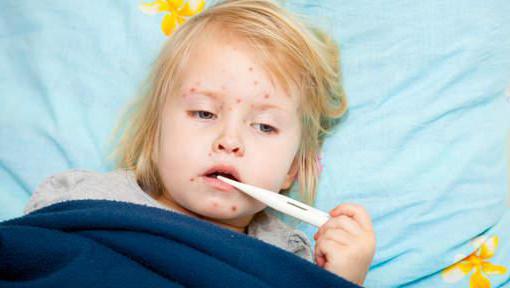
In some cases, children and adults are given a medical exemption from vaccinations for 2 weeks. For example, after a cold. But in practice, routine vaccination is most often postponed for 30 days.
The doctor fills out the appropriate form-certificate, puts his personal signature and the seal of the medical institution there - it’s done, you don’t have to be afraid of the next vaccination for some time. In some cases, it is necessary to assemble a consultation or an entire commission. In such circumstances, you will have to wait some time until a group of doctors decides what to do with vaccination.
Temporary illnesses
Medical advice from vaccinations for adults and children is issued under the responsibility of medical personnel. Therefore, it is important to have contraindications to vaccination. Otherwise, issuing a certificate may be regarded as a violation of the laws of the country. What are the reasons for issuing a document to defer vaccination?
Some believe that a child’s poor condition on a given day is an excellent reason to obtain a medical exemption. But as practice shows, this is not at all the case. If the child is healthy, but today he does not feel well, you should not hope for a delay in vaccination. You must have valid reasons for obtaining a certificate.
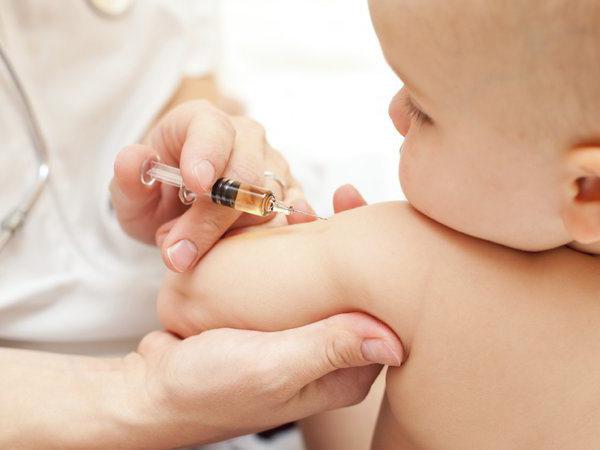
Yes, a temporary illness can be a sign of serious health problems. But if the doctor does not see them, there is no obstacle to routine vaccinations. Parents themselves can write a temporary waiver of this procedure for a certain period of time.
Medical withdrawal from vaccinations: reasons
The factor in refusing the procedure is not only such a subjective reason as the parents’ fear of side effects. There are completely objective contraindications based on medical knowledge and recommended by WHO.
Medical exemption from vaccination can be obtained in the following cases:
- a severe allergic reaction in a child to a previous vaccine administration;
- identified allergy to any of the components in the composition of the drug, for example, sensitivity to chicken protein, which is included in most products;
- in case of disturbances in the functioning of the immune system, including oncology, HIV infection and taking certain medications;
- during the acute phase of any disease, accompanied by an increase in temperature;
- Low body weight of the newborn (less than 2.5 kg) serves as a disqualification from BCG vaccination;
- The combined pertussis vaccine, known as DTP, is not given if the child has had seizures.
- shift the timing of vaccination to a later date in premature infants.

In general, any vaccination procedure should be preceded by a medical examination. A pediatrician, and, if necessary, an immunologist, will weigh the pros and cons and help parents make the right decision.
Relative contraindications
Most often, the population is faced with relative reasons for delays in vaccination. We can say this is a temporary phenomenon. There are a lot of relative reasons; the enumeration can last a long time. But most often they include some deviations in the analyzes.
Do you need a medical exemption from vaccinations? The reasons why this certificate is temporarily issued are varied. These include:
- chickenpox;
- allergic reactions;
- acclimatization of the child;
- recent contact with any sick person.
The possible list of relative reasons for receiving a medical exemption does not end there. Just some points require more detailed consideration. So what should you pay attention to?
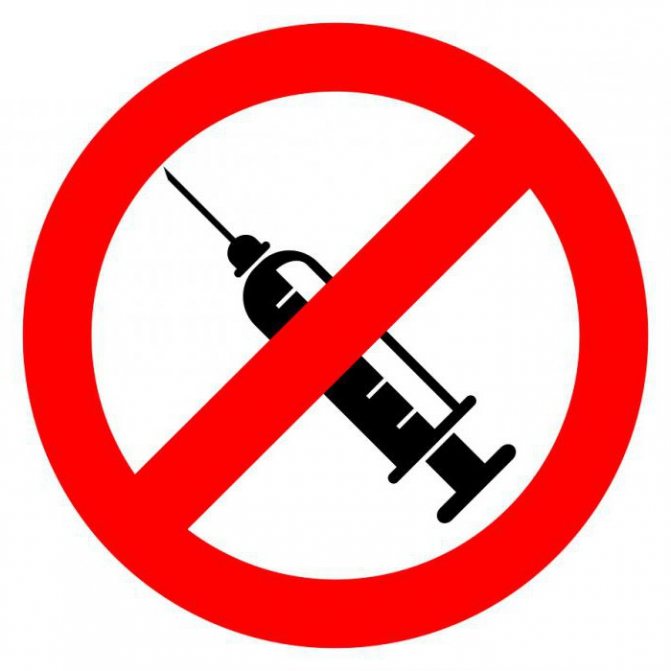
How is a medical withdrawal issued?
Why is it sometimes more profitable to receive a medical exemption than to simply refuse vaccinations? If you have an officially confirmed medical exemption, you do not need to sign and justify your refusal every time you get vaccinated. Let us note, however, that doctors also cannot give a medical exemption without compelling evidence for the child’s health. Therefore, if you have any arguments other than medical ones in favor of refusing vaccinations, you will still have to sign them regularly.
To obtain a medical exemption, you need to get a certificate from a highly specialized doctor confirming the child’s illness. Then, with this certificate, you need to go to a pediatrician, who will review your application and decide whether to give medical advice due to a specific disease.
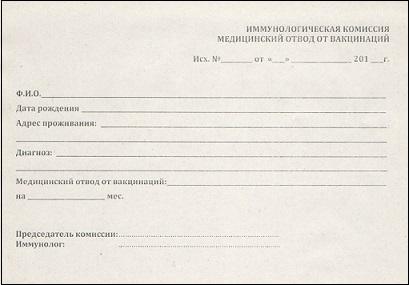
Let us additionally note that obtaining an absolute medical withdrawal now is almost impossible. Only temporary and maximum - six months.
Both the state clinic to which the child is geographically affiliated and a private clinic can issue a medical exemption from vaccinations to a child. The document itself is issued free of charge and is issued in a few minutes if the evidence is available.
The form is a sheet of paper, on one side of which there will be the text of interest to us. The information contains the patient’s full name, the reason for the prohibition from vaccination, the date of issue of the medical exemption and its validity period. Most often, the document is issued for a month, after respiratory infections - for two weeks.
The medical withdrawal form must have the signature of the doctor who issued the document, as well as the seal of the medical institution. Only in this form is the document considered officially valid.
Popular How to prevent diphtheria in children by vaccination
For residual effects after an illness
A medical exemption from vaccinations after a temporary acute respiratory infection is issued to a child if he has not yet fully recovered from the cold he suffered. If a child has only minor nasal discharge from the disease, he will be allowed to get vaccinated. But if the child continues to cough, they will most likely give a medical discharge.
With existing ARVI
In this case, it doesn’t even matter how seriously the child is ill: if there are symptoms of ARVI, vaccination cannot be done. A runny nose, high temperature, cough and other unpleasant manifestations of a cold viral disease are a direct prohibition for vaccination.
If a child falls ill with a mild form of acute respiratory viral infection or a mild intestinal infection, he can be vaccinated immediately on the day of discharge. If the disease occurs with complications, after recovery you must wait a month and only then vaccinate. During this period, the immune system will have time to recover and respond adequately to the vaccine.
With weakened immunity
Vaccination is the artificial infection of the body with pathogenic viruses, albeit on a small scale. But for a weakened immune system, this small dose may be enough. The body of a weak child may not be able to cope with the pathological microorganisms that have invaded it: as a result, illness. To avoid such an outcome, people with weakened immunity are usually given a temporary medical withdrawal.
For allergies
Children are entitled to medical treatment if they are allergic to the components of the vaccine: in this case, vaccinations containing these components cannot be given. A substance that causes an allergy, once in the body, can lead to consequences: including the appearance of hives, swelling, and even anaphylactic shock.

If a child is allergic to yeast, then he can be vaccinated against hepatitis B only after the written consent of the parents.
For diseases of the nervous system
If a child suffers from nervous system disorders, a side effect of this may be seizures after vaccination. Usually, if such manifestations are likely, a medical discharge is given.
For malignant tumors
In this case, vaccination is prohibited, since the entry of pathogenic strains into the body poses a serious threat to an already severely weakened immune system.
Contraindications for vaccination in children
Each vaccine has contraindications: all points are indicated in the instructions for the drug. Standard and considered prohibitions for vaccination are considered to be a child's illness with influenza or ARVI. Allergies and nervous system disorders must also be taken into account. An individual list of contraindications is compiled for children at risk in the following categories:
- those who are immunocompromised or have HIV infection;
- those suffering from cancer, tumors, especially during radiation therapy;
- for allergy sufferers;
- often suffering from viral colds;
- with autoimmune diseases;
- with neurological disorders;
In addition to absolute contraindications, there are also relative ones. The last types of bans are temporary. Most often, relative contraindications for vaccination are important if there are any abnormalities in the child’s tests. In addition, this:
- chickenpox;
- acclimatization of the child;
- allergy;
- recent contacts with a sick person.
In addition to those listed, there are likely other contraindications of a relative nature - they are considered individually. The decision on whether or not to give a child a medical diversion is made by both the pediatrician and doctors of various related specializations: those that affect this area.
Popular Main complications in children after DTP vaccination
If your child has a fever
Medical advice from vaccinations, the causes of which are fever in children, is given in any case. As you know, +36.6 degrees is considered normal body temperature, but vaccination is allowed up to +37. When the temperature rises above +37 degrees, it is prohibited to vaccinate the child.
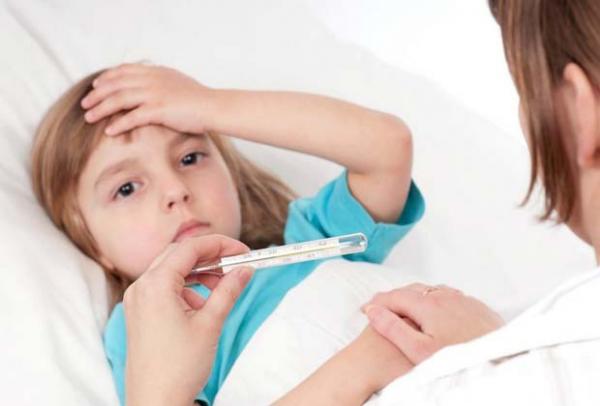
If the doctor sees that the child will recover soon, he will prescribe a vaccination in the coming days after a routine examination. If the temperature is accompanied by a runny nose, cough and other manifestations of a respiratory disease, then the vaccination is done only after the child has fully recovered.
Usually, if a fever or viral disease is detected, a medical exemption from vaccinations is given to the child for two weeks.
It is very dangerous to vaccinate when a child has a fever, cough and other cold symptoms. The body, already weakened by a viral disease, may simply not be able to cope with another portion of pathogenic microbes, and as a result, the child may be at risk of complications. The BCG vaccine is especially dangerous when there is a fever and other signs of a respiratory infection.
If the child is feeling weak
It also happens that the child does not have a fever or other obvious symptoms of illness, but he still feels unwell. If a child experiences lethargy, drowsiness, or apathy, parents have every right to be wary before vaccination.
It is recommended to examine the child and also take a general blood test. The analysis will determine whether hemoglobin and other important indicators are normal. The examination will also help to identify whether there are any inflammatory processes in the body. If low hemoglobin or an inflammatory infection from vaccination is detected, a medical exemption is given until the child’s health is completely restored.
Sometimes lethargy is caused by a child’s inadequate diet or lack of vitamins and minerals in his menu. In this case, a medical discharge can also be issued until the moment when the child feels more alert.
BCG vaccination
This vaccine is one of the main ones; the first vaccination is given to the child in the maternity hospital. BCG is a vaccine against tuberculosis. The vaccine contains a small number of strains of tuberculosis bacillus.
This vaccination scares many parents for certain reasons, and some even refuse to have it. However, doctors claim that refusing the first BCG vaccination is a negligent attitude towards the health of your own child. Officially, a medical discharge in this case is only required if the child was born premature or was underweight at birth. BCG vaccination is not given to newborns if the mother has recently had the flu: in this case, the child should be under medical supervision for some time.
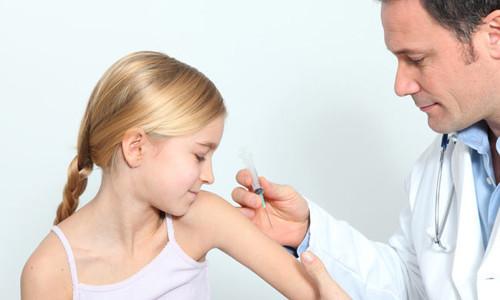
As soon as the child gains the required weight, he is vaccinated, but after a negative Mantoux test.
Temperature deviations
The most common scenario in which a medical exemption from vaccinations is issued for some time is when a person’s temperature deviates from the norm. Ideally, in humans it should be no higher than 36.6 Celsius. But as practice shows, vaccination is carried out at a temperature of 36 to 37 degrees. This is how things really are.
If a child has low energy or has a fever, he should not be vaccinated. But they may not even give you a medical referral—the doctors simply tell you to come back the next day to check the child’s condition. Maybe he just has a temporary loss of strength. Then you will immediately receive a routine vaccination.
As practice shows, sometimes even an elevated temperature does not bother doctors, and they do not delay vaccination. Only irresponsible cadres behave this way. Unfortunately, this behavior is not so rare. After all, low/high temperature is often considered a temporary phenomenon.
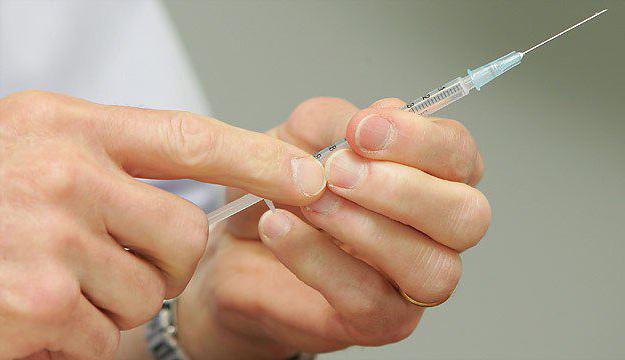
Diseases
Very often a medical exemption from vaccinations is given after an acute respiratory viral infection. Exactly the same as after other diseases. Indeed, the relative reasons for receiving our certificate today include the presence of a particular disease. It doesn't matter which one. Even a common runny nose can cause a delay in vaccination of a child and an adult.
Perhaps no one undertakes to vaccinate a sick child. As practice shows, in this case, a medical certificate from vaccinations is issued for 2 weeks after the illness. Or in general for a month from the date of discovery of the disease.
Absolute liberation
In addition to the relative reasons for obtaining a medical deferment from vaccination, absolute exemption can be distinguished. In such circumstances, you will either be denied this or that vaccination for life, or for about a year. What is the absolute reason for which a medical exemption from vaccinations of up to a year can be obtained? These include:
- HIV and AIDS;
- oncological diseases;
- undergoing chemotherapy;
- systematic diseases in chronic form;
- anemia;
- decreased hemoglobin;
- allergic reactions to vaccine components;
- acute diseases accompanied by a malignant course.
Often, in such circumstances, patients are given a medical exemption from (specific) vaccinations for life. Typically, DPT is most often excluded from the standard vaccination list. This is quite normal, because this drug is considered heavy. It is not always well tolerated even by perfectly healthy children. By the way, vaccinations after medical withdrawal will be carried out exclusively on an individual schedule. Otherwise, there is a high risk of complications in a person at any age. Remember this.

What is a medical outlet?
Before a child is vaccinated, he must be examined by a pediatrician. In some cases, the doctor recommends blood and urine tests before the procedure. If everything is in order, the doctor indicates in the child’s card that vaccination with a specific drug is currently permitted. However, any type of immunization has contraindications, including ARVI, influenza, and childhood infectious diseases. In this case, you should wait for the child to fully recover and only then vaccinate.
There are also more compelling reasons for refusing vaccination for a period of six months to three years - severe illness, immunodeficiency, allergic reactions to the vaccine. In all of the above cases, the doctor issues a medical exemption - official permission not to vaccinate the child. The main feature of this document is that you do not need to sign a waiver of vaccinations for the entire period that the document is valid.
Consilium and commission
It has already been said that under certain circumstances the doctor cannot independently decide to postpone vaccination. Instead, a medical commission is assembled to assess the situation of a particular patient. In the end, the most correct decision will be made. And if doctors consider the reasons for delaying vaccination to be really serious, they may cancel it altogether. Very dubious reasons for medical withdrawal include:
- negative reaction of the body to previous vaccines;
- any immunodeficiency;
- underweight;
- diseases of the nervous system;
- The patient has an allergy to egg white.
It's also worth noting that some vaccinations cannot be delayed for medical reasons. For example, everyone must undergo ADS and ADSM. The exception is a lifetime exemption from vaccination. It is also believed that the polio vaccine should also be given to everyone who is not exempt from such injections for life.
After the medical examination
What to do if you have been issued a medical exemption from vaccinations? It has already been said that this certificate requires the preparation of an individual vaccination schedule. This is usually performed by a pediatrician. But especially responsible parents prefer to contact an immunologist. Only he will be able to correctly draw up a schedule of vaccinations for you and your child, taking into account all the features.
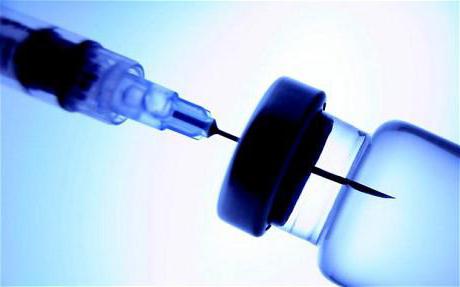
If you are categorical about any vaccines and do not intend to give them to your child, there is no need to bother your head with medical advice. Just write a refusal to vaccinate. Parents themselves have the right to decide which vaccinations to give and not to give to their minor child. If you are afraid of negative consequences, you can refuse such injections for a certain period. For example, until the child turns 1 year old, by this time the immune system is already more stable. Many parents do just that. In any case, if you want to get the most accurate vaccination schedule, you need to contact an immunologist.
What are the medical reasons for vaccination?
It is important to document the medical restriction regarding vaccinations correctly. Before issuing a conclusion, the doctor refers the child to a commission and prescribes tests and examinations. There are two types of restrictions for immunization:
- Temporary. The restriction is given for a certain period. It depends on the reason for which the vaccination is postponed. Typically, temporary medical withdrawals do not exceed one month.
- Constant or absolute. It is given to those children who cannot be vaccinated for health reasons. In this case, the condition cannot be eliminated by any means.
Indications for temporary medical diversion
It is necessary to temporarily refuse immunization if the child has recently suffered from severe infectious diseases. Even a common ARVI may be a reason to postpone the vaccine.
The peculiarity of a time limit is that it is given for a certain period. After the completion of the period, the child is vaccinated according to an individual schedule. Due to the postponement of the main vaccinations, subsequent vaccinations and revaccinations have to be postponed.
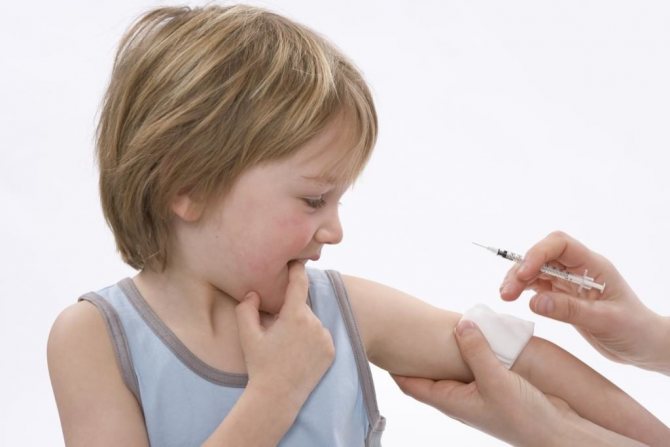
The following are considered grounds for medical withdrawal:
- acute allergic reaction;
- increased body temperature of unknown origin;
- colds and viral diseases;
- severe bacterial infections;
- surgical interventions;
- unfavorable epidemic situation;
- blood diseases;
- injuries;
- systemic manifestations;
- poor tolerance to hyperthermia;
- convulsive states or tendency to them;
- neurological diseases;
- lack of body weight;
- delayed development and growth;
- mental disorders;
- prematurity.
The World Health Organization has signed a document that regulates the timing of restrictions on vaccination for certain diseases. His list included vaccinations such as DTP, polio, mumps and measles. Depending on the severity of the disease, immunization is delayed for a period of one month to a year.
Temporary medical exemption is issued for those children whose immune system is currently overloaded. If in the future there is a restoration of the resource of the body’s protective properties, then vaccinations will be postponed for a certain period.
Indications for permanent medical diversion
A permanent or absolute medical exemption from vaccinations is given to children who have irreversible contraindications to vaccination. The doctor cannot make such a decision on his own. Therefore, a commission is first assembled to assess the baby’s condition and study his medical history.
The basis for issuing an absolute ban on vaccinations is:
- congenital immunodeficiency;
- acquired immunodeficiency syndrome;
- some autoimmune diseases;
- oncological diseases;
- treatment with cytostatics or chemotherapy;
- incurable anemia;
- chronic systemic diseases;
- intolerance to the components of immunization preparations;
- malignant neoplasms with the prospect of progression.
Severe side effects to a specific vaccine in the past also become the basis for complete medical withdrawal . More often, such restrictions are given to children after DPT, vaccination against measles and rubella, as well as polio. Each subsequent vaccination can cause serious symptoms. Therefore, the doctor assesses the risks and benefits of immunization, after which he decides on a medical exemption or sends the child for vaccination.





